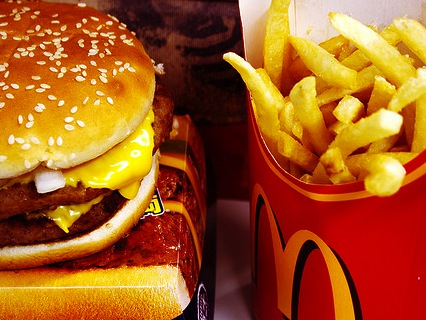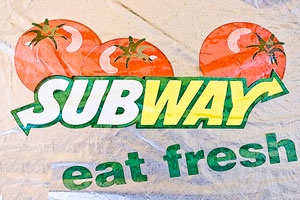
<a href="http://www.flickr.com/photos/joe_gray/4116713444/">Joe Gray</a>/Flickr
You can walk into any McDonald’s in America and buy a bounty of ready-to-eat calories for just a few bucks.
But can you cook much better food for yourself for even cheaper? That’s the message of Slow Food USA’s ongoing $5 Challenge, and of a recent column by New York Times recipe wizard/food politics columnist Mark Bittman. Bittman’s piece links to a handy infographic showing that the typical burgers-and-fries dinner for a family of four at McDonald’s costs about $28, while a home-cooked chicken-and-potatoes meal for four would run you just $14.
I agree with the message that Slow Food and Bittman are sending here: that from-scratch cooking is absolutely the most powerful tool we have for improving our diets and resisting the food industry’s most awful offerings. But I sense a significant accounting error: They omit the cost of labor for the home-cooked meal and include it in the fast-food alternative, which comes begging to be inhaled immediately, no postprandial dish-doing necessary.
The Times calculated the cost of its $14 chicken dinner by summing the price of the individual ingredients: a $6 raw whole chicken, $3 worth of potatoes, a nickel for salt and pepper, etc. But what about the time it takes to plan the dinner, shop for the ingredients, transform them into a meal, and then clean up the resulting mess?
The Bureau of Labor Statistics (BLS) tells us that the median hourly income in the United States is $16.27. Let’s say it takes two hours to put the Times‘ meal together and clean up afterward—for the median US worker, that’s about $32 worth of labor. Voilà! Our chicken dinner now costs around $46. Suddenly, that $28 Mickey D’s excursion looks like quite the bargain.
Yet that bargain seems deeply problematic. McDonald’s adds to its customers’ leisure time in part by exploiting its own workers. The labor-adjusted price advantage McDonald’s offers over a home-cooked meal largely reflects the fast-food industry’s success at de-skilling and low-balling its own workforce. A “cook” at McDonald’s doesn’t so much cook as oversee the operation of simple-to-use cooking machines. As the BLS puts it: “Duties of these cooks are limited to preparation of a few basic items and normally involve operating large-volume single-purpose cooking equipment.” It’s no surprise, then, that the median wage listed by the BLS for “Cooks, Fast Food” is $8.70 per hour—just over half of the median wage for all professions.
But I can see why American families, facing recessionary pressures and ever greater professional demands, so often leverage the fast-food industry’s cheap labor pool for a fuss-free meal.
Bittman’s accounting error is significant, because it allows us to underestimate the depth of the problem: McDonald’s really is making an offer that’s hard for millions of families to refuse. It’s neither all in their heads nor solely the function of (admittedly) powerful marketing.
The trick, for those of us who would like to see Americans doing more of their own cooking, is to convince people to value time in the kitchen more than they do leisure activities like TV watching or video gaming. On this point, I converge with Bittman and the Slow Food people. Bittman sees two obstacles, one political and the other cultural, to the goal of a broad-based cooking revival:
The cultural lies in celebrating real food; raising our children in homes that don’t program them for fast-produced, eaten-on-the-run, high-calorie, low-nutrition junk; giving them the gift of appreciating the pleasures of nourishing one another and enjoying that nourishment together.
Political action would mean agitating to limit the marketing of junk; forcing its makers to pay the true costs of production; recognizing that advertising for fast food is not the exercise of free speech but behavior manipulation of addictive substances; and making certain that real food is affordable and available to everyone. The political challenge is the more difficult one, but it cannot be ignored.
I would add another suggestion that combines the cultural and the political: reintroduce cooking classes—home ec, aimed at teaching basic kitchen skills—to the public school curriculum alongside reading and math. Cooking is a habit, one that Americans have largely lost. Interest in it is growing, but probably not fast enough. If you don’t know how to handle a knife or stock a working home pantry, it’s doubtful you’ll ever learn to enjoy cooking. Fewer people are now learning those skills at home, and people who can’t cook are in no position to teach their kids to do it. If the public schools don’t fill the void, who will—the fast-food industry?
















